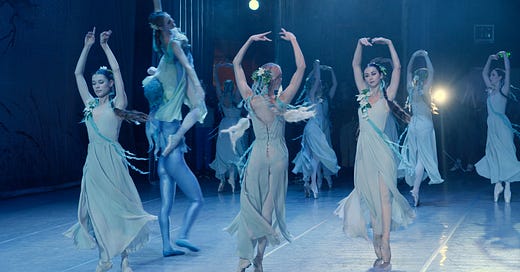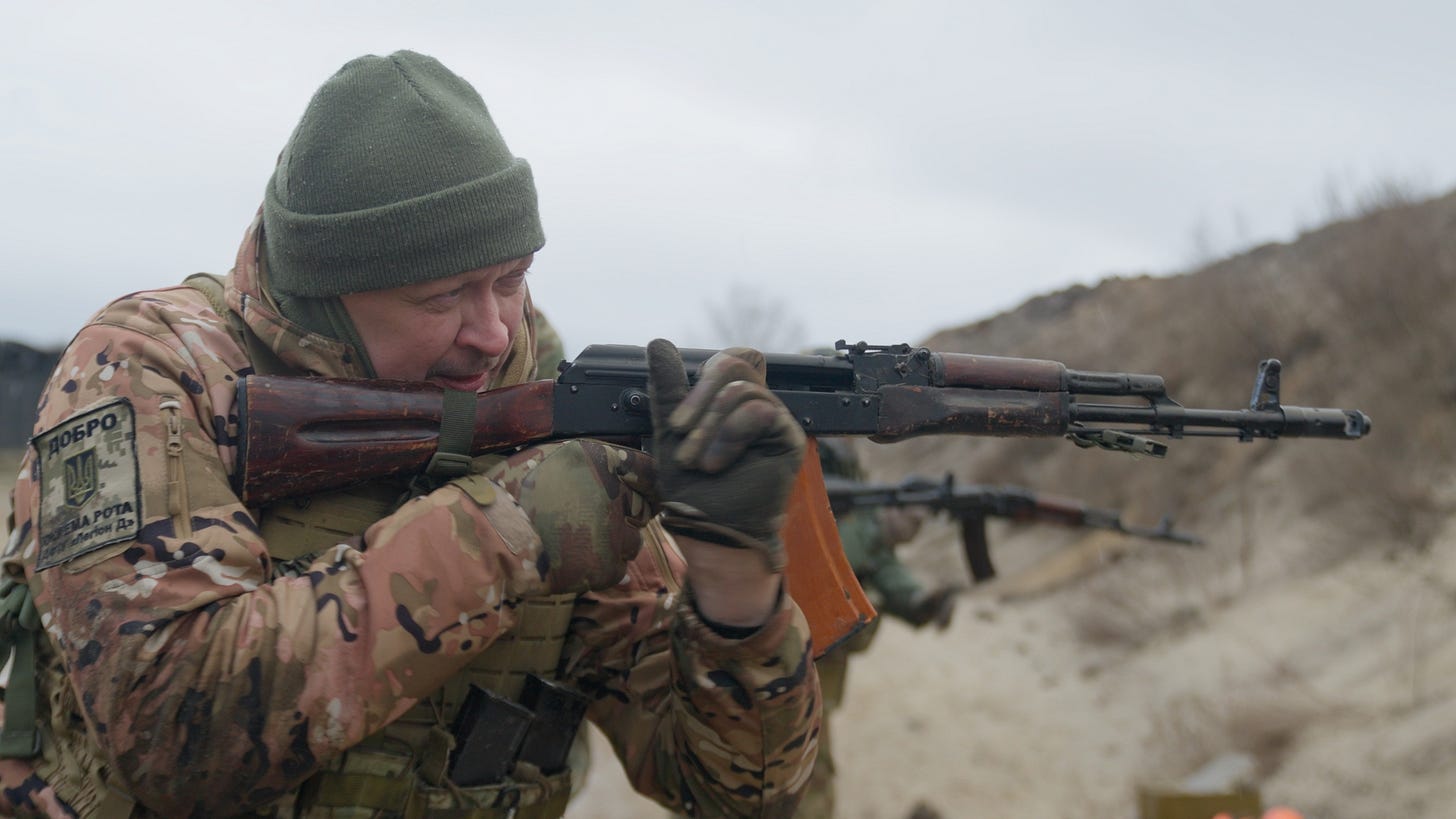Backstage in a War Zone
A Conversation with Julie Meyer, Producer of the Documentary The Sky Was on Fire, about the Ukrainian National Ballet
The National Ballet of Ukraine onstage in Kyiv
I recently spoke with Julie Meyer, producer of The Sky Was on Fire: Ballet and War in Ukraine, a powerful new film that documents day-to-day life at the National Ballet of Ukraine under Russian invasion. The documentary, which premiered at the Florida Film Festival, was created by the Florida-based production company Adrenaline Films, whose usual projects revolve around theme parks, extreme sports, award shows, and food. In fact, The Sky Was on Fire is the result of a random confluence of events: Meyer happened to be involved in a fundraising gala in which dancers from the National Ballet of Ukraine performed in Orlando, just months after Russia’s full-scale invasion. Backstage, she and her colleagues heard harrowing stories from the dancers and staff, including Oleh Tokar, a stage manager at the company in Kyiv who doubles as a commander in the Territorial Defense Forces at night. This led them to want to delve further into the lives of these artists working under the constant stress of war. They took two reporting trips to Kyiv, during which they filmed life at the Opera House and in the streets of Kyiv, a bustling, cosmopolitan city. The result is a moving portrait of artists who continue to make art and live their lives as best they can.
How did the film come about?
After the full-scale invasion broke out in February 2022, Marc McMurrin and the Ginsburg Family Foundation brought over about sixteen dancers from the Ukrainian Ballet for a gala performance to raise funds, which went directly back to Ukraine. I was working at the Phillips Center at the time and was the production manager for the show. He also hired Jonathan Maricle, who in turn hired Adrenaline Films to film the night. That event eventually became Nadiya Ukraine, a film that aired nationally on PBS and won us a Suncoast Emmy Award.
Standing backstage, just chit-chatting, we heard these tremendous stories—almost incomprehensible—about their lives. That’s where I met Oleh Tokar, the company’s stage manager. He showed me a photo on his phone of himself in fatigues, with another younger man, one of his students. They had rifles in their hands. The image gave me head-to-toe goosebumps.
How did you come to the decision to make a movie?
These stories were bouncing around in our heads for a few months, until Jonathan Maricle approached Adrenaline and said, “Look, I think there's a bigger story here. These voices need to be heard.” Michael Murray, the owner and president of Adrenaline, immediately agreed that this was something we had to do. By August of 2023, we were making our first trip to Kyiv.
Oleh Tokar, stage manager at the National Ballet of Ukraine, and one of the subjects of The Sky Was on Fire.
You can’t have taken the decision to travel to a war zone lightly.
Everyone has to make a choice. The three of us—Jonathan Maricle, Michael Murray, and I—knew that the only way to tell this story was to go. We had to weigh the risk.
Was it hard for your wife to accept that decision?
She was insanely supportive, as always. But also, like Tatiana, the wife of Oleksandr Shapoval [a veteran dancer of the Ukrainian National Ballet who was killed on the front lines], she said, you have to do what’s right for you. We went twice—three weeks in August 2023 and about three and a half weeks in April 2024.
What did it feel like to be there?
The first time you hear an air raid go off, it shakes you. And the frequency with which they go off is very alarming. People there check Telegram [a messaging app], and that's where they find out whether it's a viable threat. We followed their lead throughout. We could hear the air raids at night, in the outlying neighborhoods.
Does Kyiv look like a city at war?
All of their monuments and historical buildings are sandbagged. Huge statues wear bulletproof vests. I lived in Washington, D.C. for ten years—imagine Abraham Lincoln with a bulletproof vest.
Tokar in training
What is the atmosphere like?
It’s still a bustling city. People try to maintain a normal sense of life. One time, while we were sitting at an outdoor café, an air raid siren went off. You could see everybody checking Telegram. The staff at the café went around to all the tables saying, “The air raid sirens are going. You can stay or you can go, but you have to pay your check.”
How did people working in the theater approach their daily work?
Our perception was that they felt they were fulfilling a duty, a responsibility—for two hours, two and a half hours—to tell a story and allow people to escape the war. And they, too, could escape, into a story, into their character. For those two and a half hours, they had a break from their reality.
What happens in the theater when there is an air raid siren?
They bring the curtain down. The dancers go back to their basement dressing rooms, which is as low as they can go, and the audience goes to the lowest point in the theater, which is the coat check room. The capacity is capped at 400 because that's how many can fit in the coat room. Then, when they get the all-clear, they filter back in. The management team says, “Okay, let's pick it up at the top of this movement,” and they go from there. They’ve got a routine now.
A wall of photos of people killed in Russia’s current invasion of Ukraine
Could you tell what the attitude was toward dancers who had decided to leave Ukraine and go abroad?
I think Khrystyna Shyshpor [a dancer who is one of the subjects of the film] says it best: everybody has to make a choice about what's best for them and their family, but there’s a big difference between dancing abroad on tour and dancing while the bombs are falling around you. The fact that she made the choice to come back from Barcelona really spoke to us. She was Oleksandr Shapoval’s partner for many years.
Oleh Tokar, a stage manager at the Ukrainian National Ballet, is sort of the heart of the film. Tell me about him.
He just turned 56 last week. He was a dancer who later became a stage manager. After the invasion, he immediately joined the defense forces. He ended up going to the front lines earlier this year. After we wrapped filming, he messaged me on Telegram to say, “I’m back from the front line, and I’m glad that we are no longer making our film, because nobody needs to see or experience what I saw.”
The Sky Was on Fire is currently seeking distribution.








Marina: Brilliant as always. Do you have a place in Sarasota? I would love to support this film. JIM
What an amazing story and movie! I hope it gets a distributor.